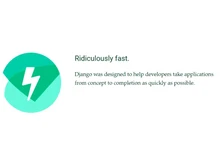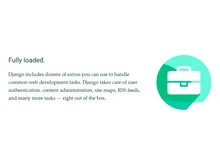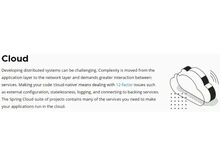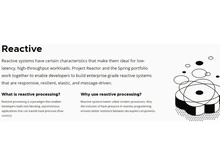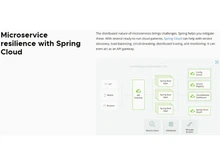In terms of web development, picking the appropriate framework is essential for creating reliable and effective applications. In the developer world, two prominent options are Spring Boot and Django. Both strive to make the process of creating web apps simpler and more efficient.
Here, we'll give a thorough analysis of these frameworks, comparing their attributes like performance, security, ecosystem, usability, and more. This is to help you choose the framework that is most compatible with your project’s requirements.
Django vs. Spring Boot: An Overview
Django is a high-level Python web framework that has gained popularity for its versatility and comprehensive set of features. It provides developers with a robust toolset that includes components for URL routing, database abstraction, template rendering, and form handling, among others. One of the key advantages of Django is its ability to rapidly prototype and build web applications due to its efficient and clean design. It follows the DRY (Don't Repeat Yourself) principle, which encourages ‘code reuse’ to reduce development time and effort. Additionally, Django has a vibrant and active community, which has resulted in a rich ecosystem of reusable components, plugins, and documentation.
On the other hand, Spring Boot is a backend framework in the Java ecosystem that focuses on providing an opinionated, convention-over-configuration approach to web development. It aims to simplify Java application development by providing sensible defaults and auto-configuration, allowing developers to focus on writing business logic instead of code. Spring Boot includes a wide array of libraries and modules that handle various aspects of application development, such as dependency injection, database access, security, and testing. It integrates well with other technologies in the Java ecosystem, making it a popular choice for enterprise-grade applications.
Django and Spring Boot: Pros & Cons
- Django is known for its high-level abstractions, reusable components, and rapid development capabilities, while Spring Boot and other Spring Boot alternatives offer a more lightweight and flexible approach with a smaller footprint.
- Django and some other Django alternatives are better suited for complex, large-scale applications, while Spring Boot is ideal for smaller projects with a simpler architecture.
- Django is a Python-based framework, whereas Spring Boot is based on Java.
Django vs. Spring Boot: In Terms of Features
- Database Support: Django has built-in support for various databases, including PostgreSQL, MySQL, SQLite, and Oracle. It also provides a high-level Object-Relational Mapping (ORM) system called Django ORM. Spring Boot, on the other hand, offers support for multiple databases through the Spring Data project, including SQL and NoSQL databases such as MongoDB and Redis.
- Development Philosophy: Django follows a batteries-included philosophy, providing a comprehensive set of features out of the box. It comes with an admin interface, authentication, user management, and more. Spring Boot follows a simple approach, focusing on providing essential features and enabling developers to choose and configure additional libraries as needed.
- Security and Maintenance: Django offers protection against common vulnerabilities and provides a robust authentication system. On the other hand, Spring Boot provides robust security features, including integration with Spring Security for authentication and authorization. Apart from that, it also provides regular updates to ensure ongoing maintenance and security improvements. In terms of security, Spring Boot is ahead of the game.
- Productivity/Development Speed: Spring Boot provides pre-built components, libraries, and frameworks, reducing the time required for web development. On the other hand, Django, with its extensive collection of modules and packages, allows developers to rapidly prototype and build applications. Apart from that, Django’s automatic admin interface also enhances productivity. Therefore, it is very clear that Django is ahead of Spring Boot.
Django vs. Spring Boot: Ease of Use
Spring Boot has an extensive repository of documentation as well as an active community that helps new users. Its convention-over-configuration methodology makes project setup less complicated. Django, on the other hand, is renowned for its user-friendly design and additionally provides substantial documentation and a supportive community. The simple syntax of Python makes Django easier to learn. In this case, Django is a clear winner over Spring Boot.
Django vs. Spring Boot: Performance
In the building of websites, performance is crucial. Enterprise-level applications are well suited for Spring Boot, which offers high performance and is supported by the Java Virtual Machine (JVM). On the other hand, Django, which is built on Python, faces performance issues. Although Django's scalability is excellent.
Django or Spring Boot: Third-Party Integrations
Spring Boot offers an extensive library that seamlessly integrates for database access. On the other hand, Django offers a wide range of third-party packages for different purposes like database management, authentication, API development, and more. Simply, Django is a better option when it comes to third-party integrations.
Django or Spring Boot: Community Support
Spring Boot has a large as well as active community. It offers extensive documentation, forums, and tutorials to make it easier for new users to find answers to their queries and get support for them. Django, on the other hand, also provides thorough documentation, making it user-friendly for beginners. However, Django’s community support is not as comprehensive as that of Spring Boot.
Django or Spring Boot: Hosting Options/Deployment
Spring Boot is compatible with a variety of hosting platforms due to its Java foundation. It offers possible deployment choices and effortlessly connects with cloud service providers. The deployment procedure is simple with Django because of its integrated support for deployment through services like Heroku. Additionally, it enables a range of hosting choices.
Which Is Better, Django or Spring Boot?
After a thorough analysis, we can say that Spring Boot is better when it comes to enterprise-level applications, scalability, performance, and more. Apart from that, it offers a mature ecosystem, extensive documentation, and robust security features, making it an excellent choice if you specifically need an application with high performance along with a focus on JavaC. On the other hand, Django is a compelling option when it comes to rapid web development, ease of learning, clean syntax, extensive ecosystem, and extensive pre-built components. The Python language encourages code readability, and its batteries-included approach makes development simpler. Moreover, developers can create apps with rich functionalities offered by Django. When deciding between Django and Spring Boot, it is important to consider the specific needs of your project and prioritize the factors that best align with your projects.


 13 Ratings & 10 Reviews
13 Ratings & 10 Reviews



